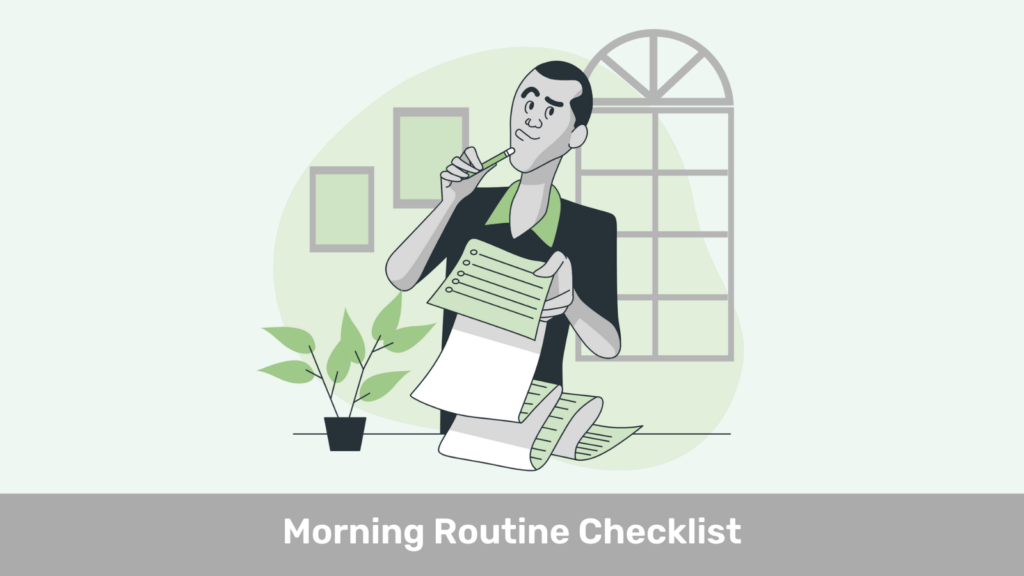Introduction
Good morning, champions of the day! Have you ever wondered why some people seem to effortlessly conquer their days, while others stumble through the morning fog? The secret might just be hidden in the power of a well-crafted morning routine checklist.
Did you know that 80% of successful people have a consistent morning routine? Yes, you heard that right! Whether you’re the CEO of a Fortune 500 company or an aspiring artist, the morning routine is the unsung hero that sets the tone for triumph.
Ever heard the saying, “Win the morning, win the day”? Turns out, there’s some science backing that up. According to a study published in the European Journal of Social Psychology, it takes an average of 66 days to form a habit. Now, imagine kickstarting your day with a checklist that ingrains positive habits, setting the tone for a successful day. Sounds intriguing, doesn’t it?
The morning routine checklist is your personalized GPS to success. From hydrating your body to engaging in mindful practices, each item on the checklist is a step toward a more productive, balanced, and fulfilling life.
Benefits of a Morning Routine
- It kick-starts your metabolism, giving you an energy boost for the day.
- It provides a sense of structure, setting a positive tone for your entire day.
- It enhances mental clarity, helping you make better decisions.
- It establishes a proactive mindset, putting you in control of your day.
- It allows for peaceful moments of solitude, promoting mindfulness.
- It cultivates discipline, a crucial trait for achieving long-term goals.
- It boosts productivity by prioritizing tasks and eliminating decision fatigue.
- It fosters better physical health through consistent exercise.
- It reduces stress by allowing you to start the day on a calm note.
- It enhances creativity and problem-solving skills by engaging your brain early on.
What Makes A Good Morning Routine?
A good morning routine is like a well-choreographed dance that sets the rhythm for the rest of your day.
Firstly, consistency is key. A routine becomes effective when it’s a daily commitment, creating a reliable structure that your body and mind can rely on. Whether it’s waking up at the same time each day, savoring a nutritious breakfast, or engaging in a few moments of meditation, the regularity of these actions helps signal to your body that it’s time to transition from rest to activity. Consistency breeds familiarity, and familiarity breeds a sense of control, an essential ingredient for a successful morning routine.
Secondly, a good morning routine caters to both mind and body. It’s not just about physical exercise; it’s about holistic well-being. Incorporating activities that stimulate your mind, such as reading or practicing mindfulness, alongside physical exercises, ensures a balanced start. Think of it as a holistic investment – the mental clarity gained from a few moments of reflection can be just as crucial as the energy boost from a quick workout. By addressing both mental and physical aspects, a morning routine becomes a comprehensive tool for self-improvement.
Lastly, adaptability is the secret sauce. While routine implies consistency, it doesn’t mean rigidity. Life is unpredictable, and so should be your morning routine. A good routine allows for adjustments based on your unique circumstances and priorities. It’s not about being enslaved to a checklist but about crafting a flexible framework that accommodates the unexpected while ensuring you stay rooted in positive habits. Being adaptable in your routine fosters resilience and prevents frustration when life throws a curveball, ensuring that your mornings remain a source of strength rather than stress.
Successful Morning Routine Checklist for Adults
Establishing a morning routine is a powerful way for adults to enhance productivity and cultivate a positive mindset. A well-structured morning can set the tone for a successful day, fostering physical and mental well-being. So here’s the morning routine checklist for every adult:
1. Wake up early
- Establish a regular wake-up time that allows for an early start to your day.
- Waking up early provides extra time in the morning for personal rituals and activities, fostering a sense of calm and control before the busyness of the day begins.
- An early wake-up time aligns with the natural circadian rhythms of the body, potentially enhancing overall well-being and productivity.
- Adequate sleep is crucial for physical and mental health, and waking up early encourages a healthy sleep routine, ensuring you get the recommended hours of rest.
- By waking up early, you give yourself the opportunity to engage in a mindful morning routine, setting a positive tone for the rest of the day.
2. Hydrate
Drink a glass of water:
- Consume at least 8 ounces (about 240 ml) of water.
- Rehydrate your body after a night’s sleep and several hours without fluids.
- Consider adding a slice of lemon or a splash of apple cider vinegar for added benefits.
Benefits of hydrating in the morning:
- Jumpstart your metabolism after a night of fasting.
- Replenish the water lost during sleep and prevent dehydration.
- Enhance cognitive function and focus by providing the brain with the necessary fluids.
Timing:
- Make it one of the first things you do in the morning.
- Before or after stretching/exercising, but before consuming other beverages like coffee or tea.
Customize based on preferences:
- Adjust the water quantity based on personal preference and body size.
- Experiment with different temperatures (cold, room temperature) to find what you enjoy.
Considerations:
- If you’re not a fan of plain water, infuse it with fruits or herbs for added flavor.
- If you consume caffeinated beverages like coffee or tea, be mindful of balancing them with water intake to prevent dehydration.
Remember, staying hydrated is crucial for overall well-being, and incorporating this simple step into your morning routine can have positive effects on your energy levels and cognitive function throughout the day.
3. Make Your Bed
The goal of making your bed is not just to have a neat sleeping area but also to cultivate a positive and organized mindset that can influence the rest of your day.
Benefits:
- Completing a task, no matter how small, can create a sense of accomplishment early in the day. Making your bed is a quick and easy task that sets a positive tone.
- Making your bed instills a sense of order and discipline. It establishes a neat and organized environment in your bedroom, which can have a positive psychological impact on your mindset.
- A well-made bed improves the overall appearance of your bedroom. It can make the space look more inviting and comfortable, contributing to a positive atmosphere.
- Starting your day with a small task like making your bed can create a momentum that encourages you to tackle larger tasks throughout the day.
Tips for making your bed:
- You don’t need an elaborate bedding arrangement. Just straightening the sheets, fluffing the pillows, and smoothing the comforter can make a significant difference.
- Make bed-making a habit by incorporating it into your morning routine. The more consistently you do it, the more automatic it will become.
- Make your bed shortly after waking up. This prevents procrastination and ensures that you start your day on a tidy note.
- If you live with others, encourage them to make their beds too. It can become a shared habit that contributes to a cleaner and more organized living space.
- Good-quality, comfortable bedding can make the bed-making process more enjoyable. It’s also an investment in your sleep quality, contributing to a better overall morning routine.
- This adds a touch of comfort and aesthetics to your bed. It’s a small detail that can make a big difference in the overall appearance of your bedroom.
4. Stretch or Exercise
Incorporating stretching or exercise in the morning is to wake up your body, improve circulation, and set a positive tone for the day. It’s a great way to boost both physical and mental well-being. The specific type and intensity of the activity can vary based on your fitness level, preferences, and time constraints. Here’s a breakdown of what each option entails:
Stretch:
Purpose: Stretching helps improve flexibility, increase blood flow to your muscles, and can help reduce muscle tension and stiffness.
Examples:
- Neck stretches
- Shoulder rolls
- Arm stretches
- Leg stretches
- Torso twists
- Touching your toes
Duration: 5-10 minutes
Exercise:
Purpose: Exercise in the morning has numerous benefits, including boosting your mood, increasing energy levels, and enhancing overall well-being.
Examples:
- Cardiovascular exercises (e.g., jogging, jumping jacks, high knees)
- Strength training exercises (e.g., bodyweight exercises, weight lifting)
- Yoga or Pilates
- Quick home workout routines
Duration: 15-30 minutes (depending on the type and intensity of the exercise)
Tips:
- Choose activities that you enjoy to make it more likely that you’ll stick to your morning routine.
- Start with gentle movements if you’re new to morning exercise and gradually increase intensity.
- Listen to your body. If you experience pain or discomfort, adjust the exercises or consult a fitness professional.
- Consistency is key. Even a short daily routine can contribute to improved health over time.
5. Mindfulness or Meditation
Mindfulness and meditation are practices that involve bringing your attention to the present moment, promoting a sense of calm and awareness. Including these practices in your morning routine can help set a positive tone for the day, reduce stress, and enhance overall well-being.
Quick Tips for Mindfulness or Meditation:
- Begin your practice with a few minutes of deep, intentional breathing. Inhale slowly through your nose, hold for a moment, and exhale through your mouth. Focus on the sensation of your breath.
- Spend a few minutes paying attention to each part of your body, starting from your toes and moving up to the top of your head. Notice any tension and consciously release it.
- Use guided meditation apps or recordings to lead you through a meditation session. There are various apps that offer guided meditations for different purposes, such as stress reduction, focus improvement, or relaxation.
- If possible, incorporate mindful walking into your routine. Pay attention to each step, the sensation of your feet on the ground, and the movement of your body. This can be done indoors or outdoors.
- Engage your senses by focusing on what you hear, see, smell, taste, and touch. This helps anchor your awareness in the present moment.
- Before or after your meditation, set a positive intention for the day. It could be a word, phrase, or goal that you want to focus on and embody throughout the day.
- Find a quiet and comfortable space where you won’t be disturbed. This could be a corner of your bedroom or living room. Consider using cushions or a chair for added comfort.
- It’s normal for your mind to wander during meditation. When it happens, gently bring your focus back to your breath or the present moment without judgment. The goal is not to eliminate thoughts but to observe them without attachment.
- If you’re new to meditation, start with short sessions, such as 5-10 minutes, and gradually extend the duration as you become more comfortable.
- Incorporate mindfulness or meditation into your morning routine consistently. The benefits often come with regular practice.
6. Personal Hygiene
Personal hygiene activities are foundational for starting your day on a fresh and clean note. While these are basic practices, personal preferences and specific skin or oral health needs may require adjustments.
Brush your teeth: Brushing your teeth in the morning helps remove bacteria and plaque that accumulate overnight, prevents bad breath, and promotes oral health.
Wash your face: Washing your face helps remove oils, dirt, and sweat that accumulate while you sleep. It can refresh your skin and prepare it for any skincare products you might use.
Shower: A morning shower not only cleanses your body but also wakes you up, improves circulation, and can be a relaxing or invigorating start to the day.
- Adjust water temperature to your preference, balancing between not too hot (which can dry out your skin) and not too cold.
- Use a mild soap or shower gel to cleanse your body.
- Consider incorporating a brief cold rinse at the end to boost alertness.
7. Healthy Breakfast
A healthy breakfast is an essential component of a morning routine as it provides the necessary nutrients to fuel your body and brain for the day ahead. It should include a combination of carbohydrates, protein, healthy fats, fiber, vitamins, and minerals. These nutrients contribute to sustained energy levels, improved concentration, and overall well-being throughout the day.
Tips for a Healthy Breakfast:
- Aim for a balanced mix of carbohydrates, protein, and fats in your breakfast. This combination helps regulate blood sugar levels and provides sustained energy.
- Incorporate fruits and vegetables for added vitamins, minerals, and antioxidants. These can be included in smoothies, as toppings for yogurt, or on the side.
- Be mindful of added sugars in breakfast cereals, flavored yogurts, and pastries. Opt for whole, unprocessed foods whenever possible.
- Drink water, herbal tea, or a small glass of 100% fruit juice with your breakfast to stay hydrated.
- Prepare simple breakfast options the night before, such as overnight oats, yogurt parfaits, or grab-and-go options for busy mornings.
- Keep your breakfast interesting by trying different recipes. This can prevent monotony and make it more likely that you’ll stick to a healthy routine.
- Skipping breakfast can lead to mid-morning energy slumps and increased cravings later in the day. Make an effort to eat something, even if it’s a quick and simple option.
Remember, individual nutritional needs vary, so it’s essential to choose breakfast options that align with your dietary preferences and any specific health considerations you may have.
8. Plan Your Day
It helps you set the tone for the day ahead and ensures that you approach your tasks with purpose and organization. Here’s a breakdown of the steps involved and some tips to make this process more effective:
Review your schedule: Take a few minutes to go through your calendar or planner to understand your commitments and appointments for the day. This could include work meetings, social engagements, or personal appointments.
Review your to-do list: Look at your to-do list or tasks that you’ve planned for the day. This might include work assignments, personal goals, or errands.
- If you have larger tasks, break them down into smaller, more manageable steps. This makes it easier to tackle them throughout the day.
- Assess the time and effort each task requires and be realistic about what you can accomplish in a day.
Prioritize tasks: Once you have an overview of your schedule and to-do list, prioritize your tasks based on their importance and urgency.
- Categorize tasks into four quadrants based on urgency and importance. Focus on tasks that are both urgent and important first.
- Choose a few tasks that are absolutely crucial for the day and make them your top priorities.
Allocate time blocks: Assign specific time blocks to different tasks or categories of tasks. This helps create a structured plan for the day.
- Group similar tasks together and allocate specific time periods to focus exclusively on those tasks.
- Allow for some buffer time between tasks to account for unexpected interruptions or delays.
Set goals: Establish specific, measurable goals for the day. This could be related to work projects, personal development, or health and wellness.
- Ensure your goals are Specific, Measurable, Achievable, Relevant, and Time-bound for increased clarity and effectiveness.
9. Read or Listen to Something Positive
It helps set a positive tone, enhances your mindset, and can contribute to your overall well-being.
- Select material that inspires and motivates you. This could be a self-help book, motivational quotes, or even a podcast featuring positive stories or affirmations.
- Rotate your content to keep things fresh. It could be a different book or podcast each day or throughout the week. Variety prevents monotony and keeps you engaged.
- If you prefer listening, create a playlist of uplifting songs, motivational speeches, or podcasts. Listening to positive content can have a powerful impact on your mood.
- If you choose to read, consider starting with a passage from a book on personal development, mindfulness, or spirituality. Take a few moments to reflect on the words and how they apply to your life.
- Combine this step with gratitude practice. Read or listen to content that emphasizes gratitude and take a moment to think about things you are thankful for in your life.
- If you’re short on time, don’t feel pressured to read an entire chapter or listen to an hour-long podcast. Even just a few minutes of positive content can make a difference.
- If you have personal affirmations or positive statements, incorporate them into this routine. Repeating affirmations can help reinforce positive thinking.
- Choose content that aligns with your personal or professional goals. It can serve as a reminder of what you’re working towards and boost your motivation.
- Be mindful of the content you consume. Avoid news or other sources that may introduce stress or negativity early in the morning.
- If you’re engaging in light exercise or stretching during your morning routine, consider combining it with positive content. It can create a holistic experience for your mind and body.
10. Express Gratitude
Expressing gratitude is a practice that involves acknowledging and appreciating the positive aspects of your life. Including this in your morning routine can contribute to a positive mindset and set an optimistic tone for the day.
This step involves taking a moment to consciously recognize and be thankful for the positive aspects of your life. It’s a practice that can shift your focus from what might be lacking or challenging to what is going well. Gratitude has been linked to various mental health benefits, including increased happiness and decreased stress.
Also Read: Gratitude Meditation
Tips for Expressing Gratitude:
- Keep a gratitude journal where you write down three things you’re grateful for each morning. These can be simple things like a good night’s sleep, a supportive friend, or a beautiful sunrise.
- Take a few moments to reflect on positive aspects of your life. This could include your relationships, opportunities, achievements, or even small moments of joy.
- Verbalize your gratitude by saying it out loud. You can express your thanks for specific people or circumstances. This vocal acknowledgment can reinforce positive feelings.
- Incorporate gratitude affirmations into your morning routine. These are positive statements that affirm the things you are thankful for. Repeat them to yourself as a form of positive reinforcement.
- Ground yourself in the present moment and appreciate what you have right now. This can help shift your mindset away from worries about the future or past.
- Each day, try to focus on different aspects of your life that you are grateful for. This helps you recognize a wide range of positive elements in your life.
- Express gratitude for the people around you. It could be family, friends, colleagues, or anyone who contributes positively to your life.
- Create a small ritual around expressing gratitude. Whether it’s lighting a candle, taking a moment of silence, or incorporating it into your morning prayer, having a ritual can make the practice more meaningful.
Conclusion
Establishing a morning routine checklist is a powerful way to set a positive tone for your day. Incorporating habits such as hydration, exercise, mindfulness, and gratitude can enhance your overall well-being and productivity. A well-thought-out morning routine helps you start the day with intention, focus, and a sense of accomplishment.
How can Woliba help?
Woliba stands out as the ideal platform for developing and enhancing your morning routine. It offers a comprehensive array of tips, resources, and expert guidance for all aspects of morning rituals. From personalized exercise routines to mindfulness practices and nutritional advice, Woliba caters to diverse preferences and lifestyles.
Contact us now to embark on a journey toward a healthier and more productive lifestyle.










